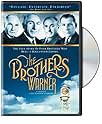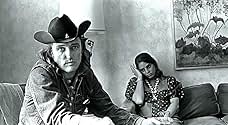An intimate portrait and saga of four film pioneers--Harry, Albert, Sam and Jack who rose from immigrant poverty through personal tragedies persevering to create a major studio with a social... Read allAn intimate portrait and saga of four film pioneers--Harry, Albert, Sam and Jack who rose from immigrant poverty through personal tragedies persevering to create a major studio with a social conscience.An intimate portrait and saga of four film pioneers--Harry, Albert, Sam and Jack who rose from immigrant poverty through personal tragedies persevering to create a major studio with a social conscience.
- Awards
- 1 nomination total
- Self
- (as Sam Goldwyn Jr.)
- Self
- (as Roy Disney Jr.)
- Self - Historian
- (as Dr. Michael Birdwell)
- Director
- Writer
- All cast & crew
- Production, box office & more at IMDbPro
Featured reviews
The brothers were as different as any four people could be - the outlandish Jack, the good businessman Harry, the kind-hearted Sam, and the quiet Albert - but the main characters are Jack and Harry.
Naturally, since this is done by a family member, the emphasis is on the positive aspects of the studio - the risk-taking to get into sound, the tough social topics the studio tackled, their work against Naziism before World War II, and their wartime contributions. The difficulties with Sam Warner's widow, Lina Basquette, are soft-pedaled. It is noted that Sam's and Lina's child was taken from her and raised by the Warners. If that strikes people as odd, it's because it's not mentioned how much power and influence the family wielded against an actress. What also isn't mentioned is that the Warners had Lina blacklisted, and she never met her daughter until she reached adulthood.
Another thing left out is exactly how Sam Warner acquired Vitaphone, but it's possible that Cass Warner doesn't know the story. The anti-Semitism was rampant in Hollywood in the '20s, and in fact, Joseph Kennedy was one of the people determined to get the Jews out of the film-making business. Therefore, when Sam, who was a big redheaded guy, went to meet the Vitaphone people, he asked Lina to wear her Catholic cross. Unaware that Sam was Jewish, Warner Brothers was able to acquire Vitaphone.
No words are minced regarding Jack's ultimate betrayal of brother Harry and his whole family, a very shocking and sad page in the family scrapbook.
Some of the people interviewed include Lina Basquette, George Segal, Efrem Zimbalist, Jr., Debbie Reynolds, Roy Disney, Sherry Lansing, film historian Jeanine Basinger, Dennis Hopper, Tab Hunter, and ex-staff members at Warner Brothers - all very good and insightful.
Jack Warner used to call Raoul Walsh into his office and moan to him that he needed him to direct a film. Who's in it? Walsh would ask, and Warner would answer, "some bum." That's probably what he thought of his actors in general; unfortunately, he seemed to view his family the same way. A fascinating story and highly recommended.
This eye-opening, historically-relevant documentary certainly reveals a very vivid portrait of the 4 Warner brothers (Harry, Albert, Sam, and Jack) where intense rivalry, rifts, money, and greed drove these 4 siblings to conduct business matters in a manner that the viewer must witness for themselves to get the full picture of what really went on behind closed doors.
This 94-minute presentation was produced and directed by Jack Warner's granddaughter, Cass Warner-Sperling.
There were a lot of neat facts about the studio. I loved learning how the KKK sued Warner for their depiction in "Black Legion"! Or, how the studio was the first to refuse to sell movies in Germany and made the first anti-Nazi film from Hollywood--even when the nation was firmly in the isolationist camp. Interestingly, the film really didn't focus so much on the stars of the day--but more on the day to day behind the scenes events. I liked this, as if you want to see more about Cagney or Bette Davis, a documentary about them would make a lot more sense.
Overall, this is the sort of film that movie lovers like myself love--especially those who adore Hollywood during the classic years of the 1920s-40s. Fascinating--as it's filled with wonderful little stories and facts that film buffs will love. My only real problem with the film is that there is just too much material for a film that's just a bit over 90 minutes long. A mini-series would really due more justice to the history of this amazing studio.
Oddly, while the documentary was filled with a lot of film clips, some of them were of pretty poor quality--particularly the grainy and washed out one from "Giant". I am really not sure why this was the case.
Did you know
- TriviaIn the film clip from Casablanca a line is spoken which isn't in the film. The clip is from the end of Casablanca, at the airport, Richard Blaine (Humphrey Bogart) tells Major Heinrich Strasser (Conrad Veidt), "Alright Major, you asked for it" before he shoots him. The actual movie simply has Major Strasser pulling his gun and Rick shooting him.
- GoofsCass Warner Sperling's commentary states that the 1927 film "The Jazz Singer," starring Al Jolson, grossed more than any movie made to that time and remained the all-time box-office champ until the release of "Gone With the Wind." It was actually Jolson's next film, "The Singing Fool," that set the box-office record that lasted until "Gone With the Wind."
- Quotes
Self - Harry Warner's granddaughter, also narrator: The truth is, they were a phenomenal team that built an empire on a dream and revolutionized Hollywood while making the most classic, relevant movies of their time.
- ConnectionsFeatures The Great Train Robbery (1903)
- SoundtracksMe, Myself & I
Written by David Campbell (as David Campbell)
Performed by Ernest S. Llab and Bettie Ross
By Arrangement with DRC Music
Details
- Runtime
- 1h 34m(94 min)
- Color
- Aspect ratio
- 1.78 : 1

































